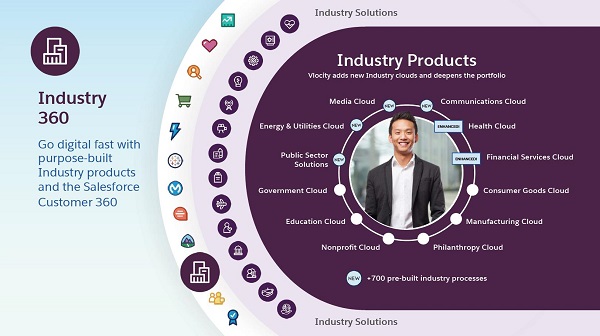The idea of vertical industry selling certainly isn’t new, but the strategy is seeing a resurgence in the customer experience and contact center environment, as evidenced in recent unrelated moves by Salesforce and Talkdesk.
Salesforce Industries
Salesforce late last month
introduced Salesforce Industries, an expansion and organizational consolidation of industry-specific clouds built on the Salesforce Customer 360 Platform. Combined with innovations from Salesforce and Vlocity, a partner acquired in February, the graphic below details the existing and new components of the Salesforce Industries product portfolio.
Stages of Industry Focus
When I hear that Salesforce is doubling-down on industries, it is a familiar refrain. Over the years, vertical marketing and selling has waxed and waned. I believe that’s because product development is seldom involved, and that is what can have the most appeal for customers. As detailed by Salesforce in response to an email query, they see three stages of industry focus:
- Stage 1 – Hire experienced executives who know their industries well and can "talk the talk." The underlying product is not industry-specific.
- Stage 2 – Articulate solutions in a way that they meet the needs of industry-specific use cases using horizontal technology.
- Stage 3 – Hire industry experts who know how to architect and build industry-specific applications that are easy to configure, integrate, deploy, and upgrade. Salesforce has moved solidly into the realm of Stage 3.
Those of us who have been in the enterprise communications space for years — in my case going on four decades — know that an emphasis on vertical selling and solutions is not new. In 1983, I was working at AT&T as an account executive and the same stages applied.
- Stage 1 – I was organizationally part of the retail sales organization, hired because I had worked in a department store for two years in high school. I supported Lord & Taylor as a national account — talk the talk.
- Stage 2 – Some of the retail-specific projects the account team worked on were centralization of billing operations from departments in each branch to a call center and centralizing operators from one to four per store to a pooled resource for each geography (Northeast, Chicago-metro, Washington, D.C. metro, etc.) — configure existing solutions for industry use cases.
- Stage 3 – My most exciting project was the automation of bridal registry. In the pre-Internet era, that included selling private lines and modems attached to data storage units in each store so that customers could shop for any bride at any store. It doesn’t sound exciting now, but it was revolutionary in its time — new product developed for the industry.
Salesforce, like AT&T 40 years ago with bridal registry, is going beyond sales and marketing to attack industry-specific product development. As part of a multi-week Salesforce Industries Summit held earlier this month, Salesforce made on-demand content and live ask-the-expert sessions for most of the industries in the graphic above. This included Communications, Public Sector, Health, and so on.
Highlighting Communications
In the Communications session, I heard stories of two digital-only mobile services using Salesforce.
Safae Hamdani, chief digital officer of inwi, a Moroccan mobile carrier, discussed how the company had launched a disruptive new brand, Win, in 2019. Win delivers a 100% digital mobile experience, powered by Vlocity (pre-acquisition) and Salesforce. Inwi designed Win to attract the growing population of millennial and Gen Z consumers who expect fast, reliable mobile service supported by a fully digital customer experience, Hamdani said.
Win was the first step in inwi’s digital transformation, Hamdani said. Having started with digital-savvy consumers, inwi is taking the same approach to transform customer experience for all touchpoints. “Those who go to a store, or call customer service — B2B or B2C — will have the same experience across the board.”
The second customer speaker was
Miguel Quiroga, CEO of Visible, a Verizon subsidiary. Like inwi has done with Win, Visible has built an entirely digital way to deliver mobile phone service. “We are here to fundamentally change the way consumers pay for and manage their phone service,” Quiroga said.
Talkdesk on the Industries Bandwagon
When I first saw the Salesforce news, I remembered that cloud contact center provider Talkdesk recently hired a vice president of financial services strategy as part of a broader industry focus. The relationship between contact center vendors and Salesforce is so intertwined, it occurred to me that perhaps Talkdesk designed its program to dovetail with the Salesforce initiative — getting on board early. In speaking about this possibility with Talkdesk CMO
Kathie Johnson, I did learn of a link between the two efforts, but not the one I had surmised.
Johnson, who worked at Salesforce for three years before heading to Talkdesk, spent part of that time focused on the company’s approach to industries. “The very first meeting I had with Tiago [Paiva, CEO of Talkdesk],” she reported, “was about ‘let's bring industries to Talkdesk.’ My industries role at Salesforce is probably one of the reasons he was interested in [hiring] me.”
Less than a year after arriving at Talkdesk, Johnson has launched her industries program. The Talkdesk website lists four industry solutions: Retail & E-Commerce, Financial Services & Insurance, Healthcare & Life Sciences, and Travel & Hospitality. Talkdesk selected these industries “after reviewing where we were receiving RFPs and where there were current opportunities — what we felt were the best opportunities for Talkdesk,” Johnson said.
To lead the industries effort, Johnson has hired a senior vice president of industry strategy who has put in place the vice president for the financial services vertical mentioned above. Johnson added she has a Healthcare & Life Sciences lead who will start soon, and she has begun publicly recruiting for executives to fill roles for Retail & E-Commerce, Public Sector, and Telecommunications.
Circling back to my question about the Salesforce Industries announcement, “We have a very tight relationship with Salesforce, as an AppExchange partner,” Johnson told me. “We're working very closely with a number of their different industry organizations, as well as Salesforce Service Cloud.” That said, Johnson made it clear that Talkdesk’s industry focus will be a broad effort, not exclusively tied to Salesforce.
To bring back the three-stage framework I outlined above, it appears to me that Talkdesk is hard at work ticking the Stage 1 and Stage 2 boxes. Stage 3, specific products with an industry focus, can often initially be supplied by partners. It will be interesting to see if Talkdesk moves to Stage 3, developing industry-specific software features.











